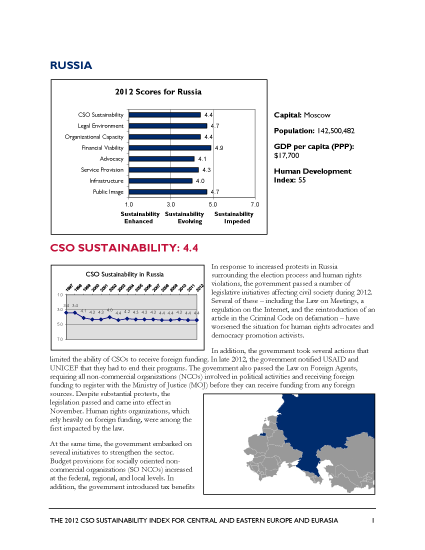CSO SUSTAINABILITY: 4.4
In response to increased protests in Russia surrounding the election process and human rights violations, the government passed a number of legislative initiatives affecting civil society during 2012. Several of these – including the Law on Meetings, a regulation on the Internet, and the reintroduction of an article in the Criminal Code on defamation – have worsened the situation for human rights advocates and democracy promotion activists.
In addition, the government took several actions that limited the ability of CSOs to receive foreign funding. In late 2012, the government notified USAID and UNICEF that they had to end their programs. The government also passed the Law on Foreign Agents, requiring all non-commercial organizations (NCOs) involved in political activities and receiving foreign funding to register with the Ministry of Justice (MOJ) before they can receive funding from any foreign sources. Despite substantial protests, the legislation passed and came into effect in November. Human rights organizations, which rely heavily on foreign funding, were among the first impacted by the law.
At the same time, the government embarked on several initiatives to strengthen the sector. Budget provisions for socially oriented non-commercial organizations (SO NCOs) increased at the federal, regional, and local levels. In addition, the government introduced tax benefits for individual donors.
Civic activism increased in 2012, mainly in the capital and other large cities, in response to political and social events, such as the tragic flooding over the summer in Krymsk and allegations of election violations, including stuffing ballot boxes and preventing election observers from entering polling stations.
According to the MOJ, as of October 2012, there were 398,202 domestic CSOs and 317 branches and representative offices of foreign CSOs registered in Russia. This number includes political parties (2,138), social and state social associations (777), Notary Public’s chambers (85), state corporations (7), and other organizations not traditionally considered CSOs. In addition, some experts estimate that about one-fourth of all registered CSOs are consumer cooperatives, membership-based associations based on ownership of shares. It is estimated that no more than 40 percent of registered CSOs are active. Approximately 10 percent of CSOs are human rights organizations, with the remaining 90 percent focusing largely on the provision of social services.








Comment
Make a general inquiry or suggest an improvement.